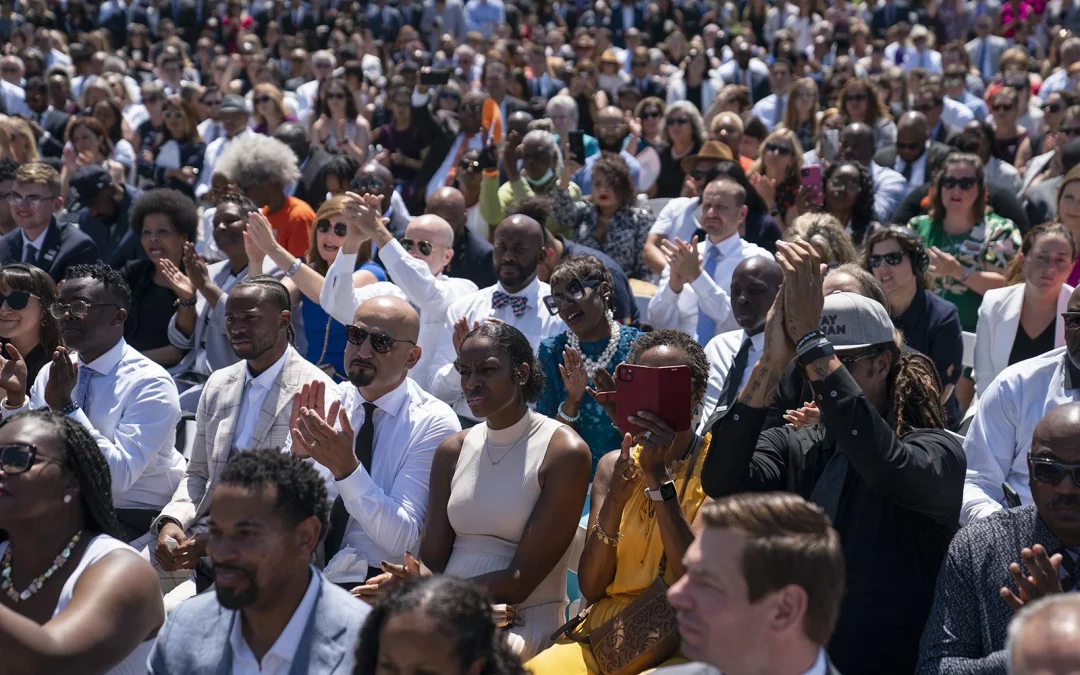
by Adelle M. Banks and Jack Jenkins, RNS | Jul 12, 2022 | Headline News, Social Justice |
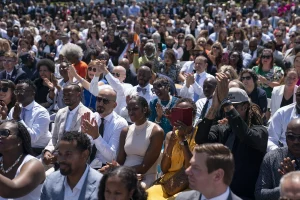
(RNS) — Faith leaders from a wide range of traditions, including those whose houses of worship have been attacked, were at the White House Monday (July 11) as members of Congress and other gun control advocates gathered for a White House celebration of the Bipartisan Safer Communities Act, signed into law June 25.
Pastor Mike McBride, the leader of Live Free USA, who has long sought political support to especially help the nation’s urban centers, hailed the signing as an opportunity to address gun violence deaths that do not always make national headlines.
“It’s been a very difficult task to get the death of Black men in this country, much less the death of any Black folks, to receive national attention and intervention,” said McBride. “Even among Democrats — Democrats have not been the most political champions for this work. So it’s taken us 10 years to get to $250 million committed in a bipartisan way.”
On hand were Rabbi Jonathan Perlman and others who endured a mass shooting in 2018 at the Tree of Life Synagogue in Pittsburgh and the Rev. Sharon Risher, whose mother was among the nine African American worshippers killed during the 2015 shooting at Mother Emanuel AME church in Charleston, South Carolina.
“That was beautiful — to see all these heroic people, survivors that have been working for change,” said Shane Claiborne, co-founder of the group Red Letter Christians and leader of an effort that melts down guns into garden tools in observance of the biblical call to turn “swords into plowshares.”
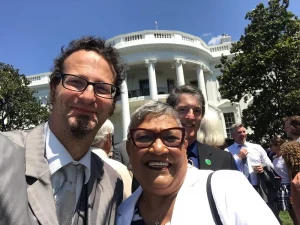 But Claiborne added that he understood that the bipartisan legislation “is the most substantial gun reform bill that we’ve seen in 30 years. But what we also heard is how dysfunctional our political process is — because there’s so much more that’s needed.”
But Claiborne added that he understood that the bipartisan legislation “is the most substantial gun reform bill that we’ve seen in 30 years. But what we also heard is how dysfunctional our political process is — because there’s so much more that’s needed.”
“We need a ban on assault rifles,” he added.
The legislation includes a variety of interventions into gun purchasing, including expansion of background checks for people younger than 21, $250 million for community-based violence prevention initiatives and $500 million to increase the number of mental health staffers in school districts.
President Joe Biden, in remarks from the White House’s South Lawn, decried the violence that has turned houses of worship, schools, nightclubs and stores into places of death.
“Neighborhoods and streets have been turned into killing fields as well,” said the president. “Will we match thoughts and prayers with action? I say yes. And that’s what we’re doing here today.”
Claiborne said he presented a Christian cross made from a melted-down gun barrel to second gentleman Douglas Emhoff, as well as to a friend of President Biden.
 McBride said his efforts with faith leaders on this issue date back to a 2013 meeting at the Obama White House, when Biden was vice president.
McBride said his efforts with faith leaders on this issue date back to a 2013 meeting at the Obama White House, when Biden was vice president.
“In 2013, we asked for $300 million, and we were told no,” he recalled. “And so some 10 years later, we’ve gotten close to that original ask.”
He said the programs for which groups like the Fund Peace Foundation seek support are “targeted for Black and brown communities that are dealing with the highest rates of gun violence,” including from gangs and intimate partners.
Other faith groups have responded to the passage of the legislation with statements of support.
“The investments in mental health services and reasonable measures to regulate guns included in this bill are positive initial steps towards confronting a culture of violence,” said Archbishop Paul S. Coakley of Oklahoma City, chairman of the U.S. Conference of Catholic Bishops’ Committee on Domestic Justice and Human Development.
“We are heartened that after almost three decades of gridlock, Congress has finally taken bipartisan action to address America’s gun violence epidemic and end violent crime,” said Melanie Roth Gorelick, senior vice president of the Jewish Council for Public Affairs. “This is a huge victory, but we cannot allow this to be the end.”
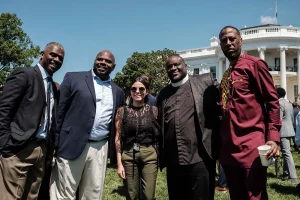 While calling himself grateful for this historic development, McBride said he and his partners will be pushing for far more support.
While calling himself grateful for this historic development, McBride said he and his partners will be pushing for far more support.
“This will be a failure if this is the only thing they do for the next few years,” he said.
Biden seemed to agree that further action was needed.
“We have so much more work to do,” he concluded. “May God bless all of us with the strength to finish the work left undone, and on behalf of the lives we’ve lost and the lives we can save, may God bless you all.”

by Adelle M. Banks and Jack Jenkins, RNS | Sep 21, 2019 | Headline News |

Cameron Strang, the founder and CEO of Relevant Media Group, found himself under attack from a host of former employees this week who accused him of behavior they said was racially insensitive and changed depending on his mood.
Relevant Media publishes a Christian bimonthly geared toward young evangelicals, as well as a website and a network of podcasts.
It was the allegation of racial insensitivity that came in a Twitter barrage on Wednesday (Sept. 18) after Relevant recommended a podcast episode about race and the church on the social media platform.
In reply, Andre Henry, an African American writer who served as Relevant’s managing editor from October 2017 through July 2018, shot back: “Several experiences & stories from my time at @RELEVANT … convince me the org is not committed at all to creating an antiracist culture internally to produce a race podcast with integrity.
“Nor do they honor Black people,” he added.
Henry followed his tweet with a blog post on Medium, titled “Black Christians Deserve Better Than Companies (And Churches) Like Relevant Media Group.”
“The company is in need of the very information they wish to publish for others,” Henry wrote.

Recent Relevant magazine covers. Screengrabs
Henry’s retorts spurred a stream of online testimonies from people who used to work for Strang, both African American and white, men and women, who registered indignation about what some called a toxic environment that they say Strang created. They described a workplace in which Strang exhibited various levels of high-handedness, shouting fits and racially insensitive slights.
On its website Friday (Sept. 20), Relevant issued a statement, headlined, “RELEVANT’s Stand on Racial Justice,” explaining that the magazine had reached out to Henry to apologize.
“In our conversations with him,” the statement said, “he discussed ways we could improve our corporate culture, and based on his insights, we are looking into options to continue improving and create systems to ensure every member of our team has a positive experience.”
After the statement brought further criticism over the course of the day, Strang appeared to delete his Twitter account.
In an interview with Religion News Service, Henry, who now works for Evangelicals for Social Action and hosts a podcast called “Hope and Hard Pills,” described Relevant’s office culture as not outright hostile to people of color — “no one’s using racial slurs,” he said — and added the staff included a range of writers.
But he said that the company’s commitment to diversity was more cosmetic than genuine.

Andre Henry. Video screengrab
“They have done well at appearing to be about racial justice,” said Henry. “They post the right things. They say the right things. They make sure that they have a good mix of people of color in the magazine and on the web, but I don’t think that in their practices as an organization that they honor people of color in that way.”
In his blog post, Henry said the beginning of the end of his tenure at Relevant came after a run-in he had with Strang over coverage of Black History Month.
Henry had planned a month’s worth of content related to the topic, but Strang reportedly warned him not to “waste editorial energy” and complained the site would have to post seven or eight articles each day online to “offset” one article about race, he said.
Not long afterward, Henry wrote, he was “stripped of all decision-making power.”
While he kept his title as managing editor, responsibility for web articles was given to the outlet’s brand manager and articles in the magazine to its contributing editor.
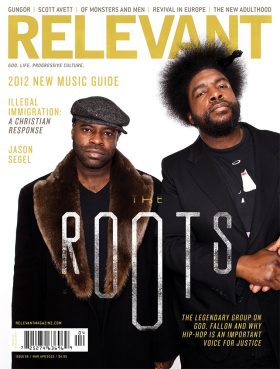
The March/April 2012 issue of Relevant, featuring The Roots on its cover. Screengrab
Ryan Hamm, who worked at Relevant as an editor and managing editor from 2009 to 2012, told Religion News Service of an incident in which members of the editorial staff, including Strang, were discussing the poor newsstand sales of an issue of the magazine that featured an image of the band The Roots on the cover.
“(Strang) said, as I recollect, ‘Well maybe our audience doesn’t want to see scary black men on the cover of Relevant,’” said Hamm, who is now employed at a nonprofit that fights religious persecution. “As soon as he said that, (I thought), ‘If that’s true, then I have no interest in writing for this audience, and I’m done.’”
Rebecca Flores, who preceded Henry as managing editor and whose pen name is Rebecca Marie Jo, wrote in a blog post published Friday that Henry’s post validated her own experiences.
She recounted a meeting in which Strang suggested running an image of a black Christian rapper with a noose around his neck as a “shocking image to symbolize his lynching by white evangelical America” after the rapper was criticized for his support of the Black Lives Matter movement.
Flores, who is Latina, said that she told Strang that she found the idea deeply troubling and offensive.
“Listen. I’m telling you, as a person of color, that if I was reading this magazine, whoa is not the reaction I would have. I would be deeply disturbed. And alienated,” she said. “We do not need to publish an image of a Black man in a noose. This isn’t a good idea.”
Flores said the incident made her feel “like I was in a trap I wouldn’t get out of safely.”
She said Strang “was obviously annoyed with me, and I left trying to hide my exhaustion towards this environment.”
RNS reached out to Strang for comment and to corroborate accounts from former staffers, but he did not immediately respond.
Strang, the son of Charisma magazine publisher Stephen Strang, founded Relevant Media Group in Orlando, Florida, in 2000, when he was 24 years old. As hip as his father’s magazine was religiously conservative, the sleekly designed magazine and website heralded unorthodox Christian heroes from the rock and literary world such as Bob Dylan and the rock band U2, about whom the publishing enterprise also issued adulatory spiritual and musical biographies.
Offering a glimpse of God in popular culture, Relevant’s magazine alone claimed a readership of more than 100,000 by the mid-2000s and had become a guide to navigating mainstream American culture for a generation of young Christian adults venturing out of the evangelical bubble.
But the publication wanted to “avoid taking any strong stances that may be polarizing,” Henry wrote on Medium. And, he believed, it catered to its “mostly white, male, conservative-leaning base.”
“It’s just not for us. We’re welcome to partake, but this is white content for white people,” Henry wrote.
Reviews of Relevant Media Group on Glassdoor, which publishes job listings and company reviews, also hint at issues within the company.
In a one-star review from June 2019, an anonymous user who identified themself as an employee who worked there less than a year, described the outlet’s “work culture” as the “most toxic I’ve ever worked in” and noted the high turnover of staff.
Another review from a user who said they are a current employee who has worked at the company for more than three years gives the outlet four stars, but expressed concerns about Relevant’s leadership.
“The CEO can be erratic, sometimes irrational (especially with female employees) and is very stubborn about everything. He is very controlling, and everything must go through him,” the review said.
Henry said he hopes Relevant’s response can be a teachable moment for evangelical organizations.
“I think that all evangelical institutions who see this, they can be looking to see what to do or not to do depending on how well Relevant doesn’t just listen to me but listens to all the other people that are chiming in,” he said.
Hamm and others were quick to celebrate the work of Relevant as a whole and pinned their frustrations specifically on Strang. Even though he used terms such as “spiritual abuse” to describe his former boss’s behavior, Hamm insisted he remained proud of the work he produced at the magazine.
“Besides Cameron, it would have been the best job I’ve ever had,” Hamm said.


 But Claiborne added that he understood that the bipartisan legislation “is the most substantial gun reform bill that we’ve seen in 30 years. But what we also heard is how dysfunctional our political process is — because there’s so much more that’s needed.”
But Claiborne added that he understood that the bipartisan legislation “is the most substantial gun reform bill that we’ve seen in 30 years. But what we also heard is how dysfunctional our political process is — because there’s so much more that’s needed.” McBride said his efforts with faith leaders on this issue date back to a 2013 meeting at the Obama White House, when Biden was vice president.
McBride said his efforts with faith leaders on this issue date back to a 2013 meeting at the Obama White House, when Biden was vice president. While calling himself grateful for this historic development, McBride said he and his partners will be pushing for far more support.
While calling himself grateful for this historic development, McBride said he and his partners will be pushing for far more support.




